I. Introduction – A Love Story
Last week, Chris introduced us to the book of Ruth. Now, he stopped at the end of Ruth chapter 2 as Ruth and Naomi were headed back to Bethlehem. We’re going to pick up in Ruth chapter 3, and will read about the love story about how Ruth met Boaz and they married. That’s right, the principle difference between Chris’ lesson and mine is that in Chris’ lesson, Boaz is ruthless.
But today we are going to discuss the love story and marriage of Ruth and Boaz.
I encourage everyone to read the books of Ruth 1-4 to get familiar with their story, it is a love story, and let me give you the overall snapshot so you understand what’s going on. Chris taught an excellent lesson last week about the decisions Ruth made that affected our lives today; Ruth was the great grandmother of King David and by her example showed us how to have a winning walk toward the promised land and how important our decisions are.
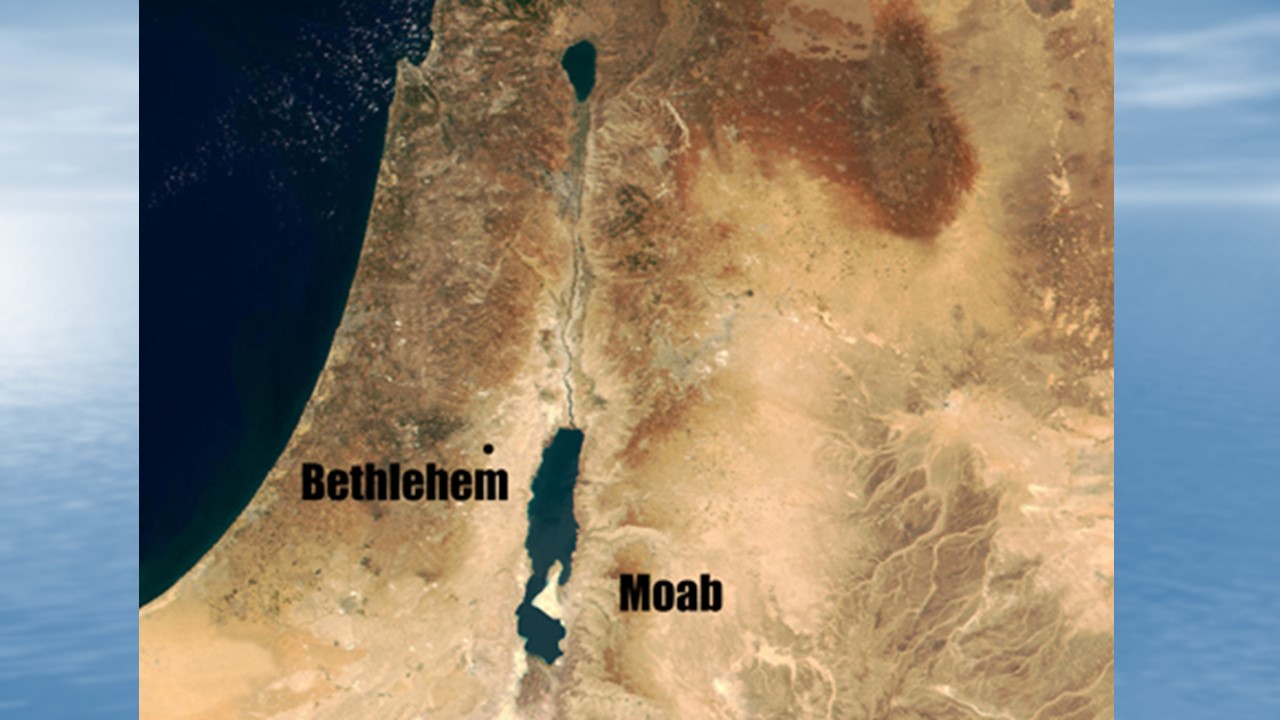
In Ruth chapter 1, Elimelech and Naomi were living in Bethlehem when there was a great famine. Elimelech and Naomi decided to move with their two sons to find food. They moved to the land of Moab, which apparently were populated by Moabites, who knew. The Moabites did not worship the Lord and treated Israelites poorly.
While living in Moab, Naomi’s husband Elimelech died. Naomi’s two sons married Moabite women named Orpah and Ruth. After 10 years, both of Naomi’s sons died, leaving Naomi and her two daughter-in-laws, all 3 widows.
The famine ended, Naomi decided to return to Bethlehem, and urged Orpah and Ruth to stay with the Moabites. As we learned last week, Orpah was stiff-necked and stayed behind, but Ruth said to Naomi, “Your God will be my God,” and Ruth and Naomi traveled to Bethlehem, arriving just at harvest time. Naomi returned to the promised land but changed her name from pleasant to bitter. Ruth, who’s name meant “friend” or “companion,” was willing to give up everything, little as it was, to be a gentile with a heart for the Lord.
Now, Naomi and Ruth are both widows, and in the days of the Old Testament and Judges, widows were not treated well. There might be plenty of food at harvest, but not for the 2 widows.
In Leviticus 19:9-10,
When you reap the harvest of your land, do not reap to the very edges of your field or gather the gleanings of your harvest. Do not go over your vineyard a second time or pick up the grapes that have fallen. Leave them for the poor and the foreigner. I am the Lord your God.
God’s people were not to harvest the outer edges of their fields because they should leave that for the poor. So when the harvest was done, Ruth went to the leftover crops and picked grain for herself and for Naomi. It so happened that the field Ruth went to belonged to Boaz. Boaz was a distant relative of Naomi’s deceased husband Elimelech, and Naomi discovers that Ruth has been harvesting in the field of a distant relative.
Naomi is pretty excited about this news – she tells Ruth that Boaz is a relative and is obligated under the law to be a “kinsman-redeemer.” Here we pause in our love story and discuss some biblical terms because, after all, this is a bible study.
There are several passages in the Old Testament that talk about the kinsman-redeemer, and the Hebrew word is “גָּאַל gâʼal” which means a relative that delivers, avenges, ransoms or purchases something. Think of it sort of like a pawn broker who hold something of value of yours. If you want that valuable, you redeem that item and it belongs to you again. A kinsman-redeemer is based on Leviticus 25:47-49.
If a foreigner residing among you becomes rich and any of your fellow Israelites become poor and sell themselves to the foreigner or to a member of the foreigner’s clan, they retain the right of redemption after they have sold themselves. One of their relatives may redeem them: An uncle or a cousin or any blood relative in their clan may redeem them. Or if they prosper, they may redeem themselves.
Naomi and Ruth are in this position, poor widows, and Naomi is excited that Ruth has found favor in the eyes of Boaz. Naomi gives Ruth a series of instructions –
- Wash, perfume yourself and put on your cloak
- Go to the threshing-floor
- Do not let Boaz recognize you during the feasting
- When he sleeps, lie down at his feet and uncover him
- Do whatever he tells you to do
II. The Seduction of Boaz
It appears that Naomi has a plan for her daughter-in-law to get rich. The phrase “uncover him” is a euphemism for sexual relations, the same phrase is used throughout Leviticus 18 about unlawful sexual relations. If Ruth seems enticing to Boaz, perhaps he will have sexual relations with her, get married, and they will both be saved. Ruth is obligated to obey Naomi, but not at the cost of obeying God’s law. How will she be both obedient to Naomi and to God?
Ruth does everything Naomi tells her to do. That night, Ruth returns to the threshing floor – remember the threshing floor from a few weeks back, when Gideon was hiding from the Midianites? Ok, he was hiding in a hole in the ground, but the threshing floor is a large flat surface used for separating the wheat from the chaff. There must have been some sort of after-harvest party because Ruth 3:7 says Boaz had finished eating and drinking and went to lay down near the grain pile. Ruth follows Naomi’s instructions and lays down at the feet of Boaz.
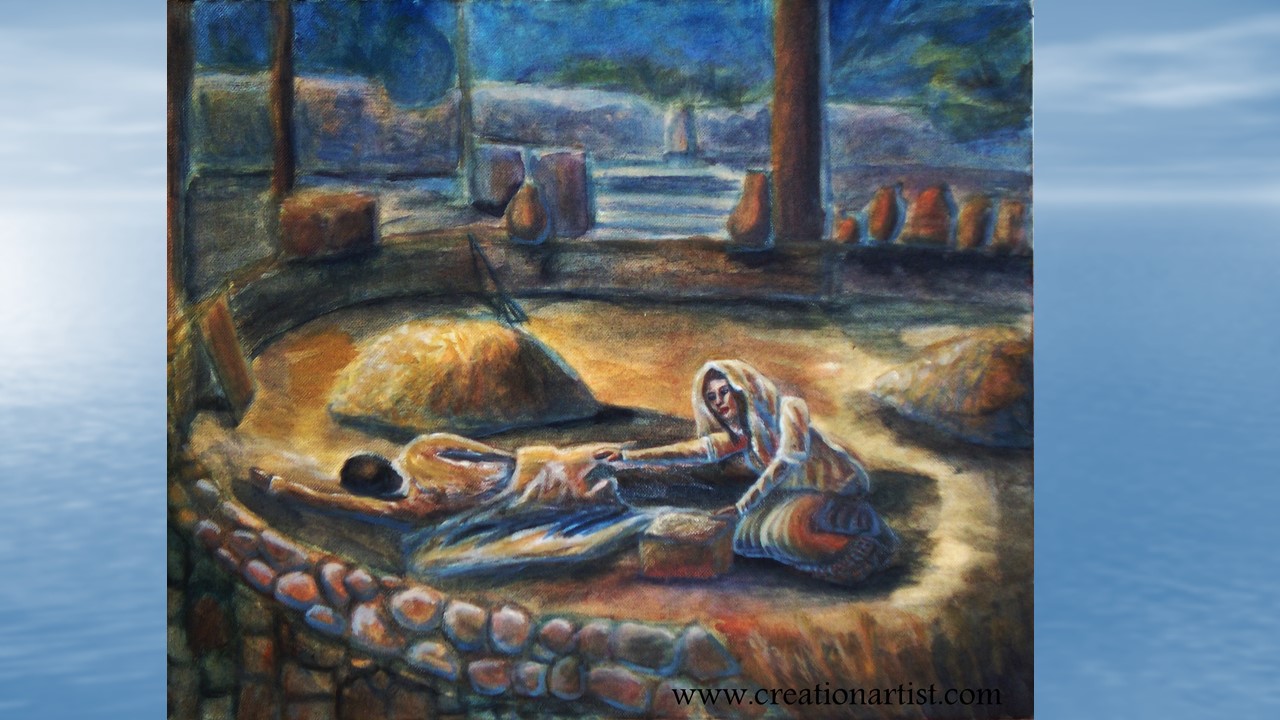
Boaz wakes up and there’s a a young woman lying at his feet. Boaz is shocked and asks Ruth what’s she’s doing. Ruth is truthful and says she belongs to Boaz if only he will redeem her, and Ruth promises to do whatever Boaz asks. She has placed her trust in Boaz as her redeemer, and fortunately, Boaz is a righteous man and Ruth’s chastity remains intact. Boaz is touched. He says to Ruth that there are plenty of younger men available, but he is flattered Ruth chose him. And Boaz will indeed redeem her, but there’s a catch – Boaz is not the closest heir. Boaz will redeem her, but because he’s a righteous man, he will make the offer to the closest heir first in front of the town elders, then leave the outcome up to God.
III. The Redemption of Ruth
At the beginning of Ruth chapter 4, Boaz finds the closest relative and asks him to sit at the gate while Boaz gathers ten of the town’s elders.

In early Israelite towns, the town gate served as the center of public business. Heavy wooden double doors were hung on large posts and were secured by bars and locks during the night. In front of the gate entrance there was an open space lined with benches where the elders sat. Matters of commerce were discussed and trade transactions were made, and the local judicial court of elders met to decide business and legal transactions. It was also where elders delivered judgments in violation of the Law, and it was outside the town gate that the guilty were punished.
So in front of the elders, Boaz tells the other relative (who is not named in scripture), “Naomi is selling the land that belonged to Elimelech.” Because of Jewish law, the closest relative had the right to redeem it, and the other heir says, “excellent, I will redeem it.”
Boaz then tells him that the property also comes with Ruth the Moabite, which the heir also must redeem if he is to accept the property. At this the heir says that’s a problem and he cannot redeem it, it puts his own estate at risk.
Think back on our pawn shop example, you’re trying to redeem something of value that the pawn shop owner has. In order to redeem it, there are 3 requirements –
- You have the right to redeem it. It rightfully belongs to you. The heir in our story has the right as a blood relative to redeem the property and Ruth.
- You have the means to redeem it. You are willing to pay the cost. The kinsman had the financial means to buy the property from Naomi.
- You are willing to redeem it. You actually want it back. The kinsman has a concern about his own estate and decides he is not willing to redeem the property if Ruth is part of the bargain.
So the right of redemption falls to Boaz. Boaz has the right as a relative, he has the mean to pay the price, and he is also willing to redeem Ruth. Ruth 4:9-10,
Then Boaz announced to the elders and all the people, “Today you are witnesses that I have bought from Naomi all the property of Elimelek, Kilion and Mahlon. I have also acquired Ruth the Moabite, Mahlon’s widow, as my wife, in order to maintain the name of the dead with his property, so that his name will not disappear from among his family or from his hometown. Today you are witnesses!”
Our love story today is possible because of the righteousness of Boaz and his redemption of Ruth. And they all lived happily ever after.
IV. The Redemption of You and Me
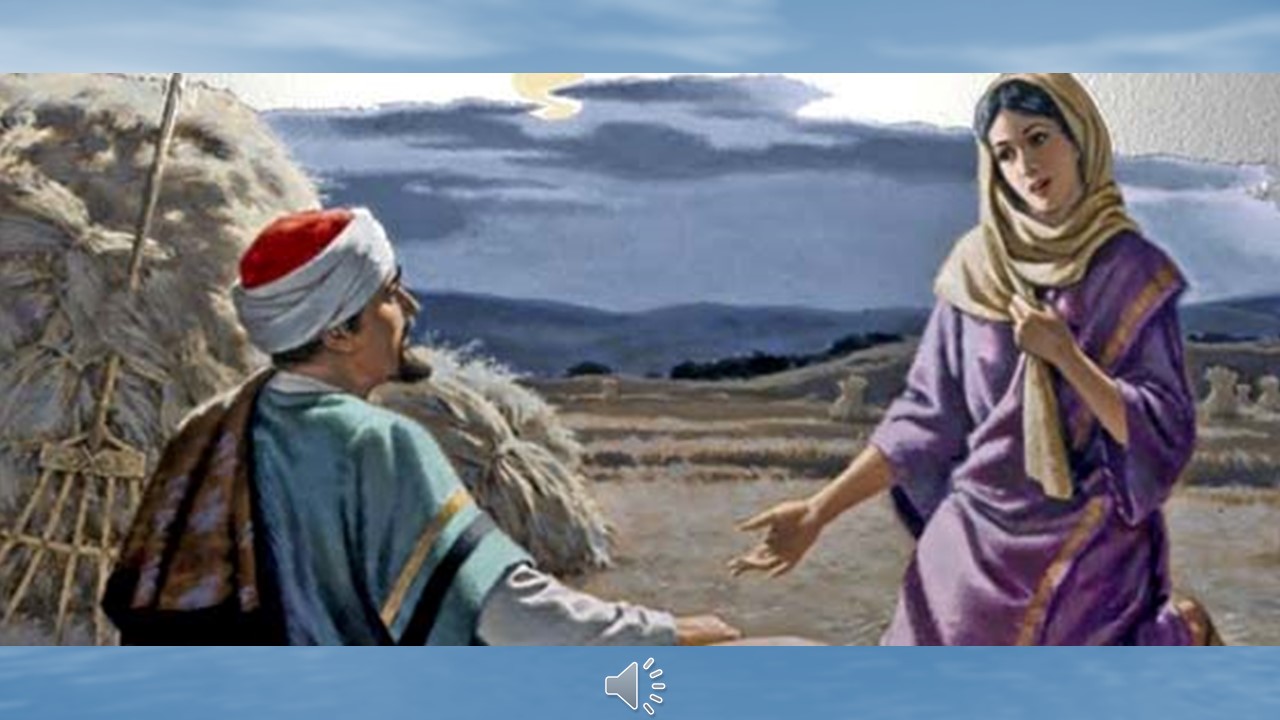
Now if this was just a love story between Ruth and Boaz, it’s a beautiful story, and nobody dies at the end like “Romeo and Juliet” or “Titanic.” But I believe God’s word has more meaning than that, and is applicable to us, today.
So, through decisions at forks in the road that Chris mentioned last week, Ruth is born a Moabite in a foreign land, but follows the God of Israel back to Bethlehem, respects her parent Naomi, and she is a widow and considered part of the property her father-in-law had. Due to somebody else’s choices, Ruth is in bondage, is lacking freedom, and cannot free herself. All she has is her choice on whether to be obedient to her mother and whether to follow the God of Israel.
Can Ruth free herself? Is there a future that is in her control? No; she is in bondage due to her ancestor’s choices, she is unable to free herself. She needs a redeemer.
Who are we? Who are you and who am I? Can we free ourselves from the bondage of sin? Is there a future that is on our control? We are in bondage to due to the choices of our ancestors, and we are unable to free ourselves from the bondage of sin. We need a redeemer. Who will redeem us from this bondage of sin?
Where does redemption fit in our theology of eternal salvation? We talk about our assurance of eternal life because of the blood of Jesus, but there are actually several things that happen in quick succession when we profess our faith and trust in the Lord Jesus.
We are born into sin; because of our sin nature – thanks a lot, Adam – but we ourselves make poor choices, and sometimes we make downright bad choices. Our sin nature puts us in the family of the devil who rules this world. And our Holy God has promised to right all wrongs and will eventually destroy all evil, including the evil that is within us. A Holy God will not permit the unholy.
On our own, it is hopeless. Romans 3:23 says we are all sinners,
for all have sinned and fall short of the glory of God

We are subject to the wrath of God, unless somebody purchases us, redeems us from our sin. This scripture, Romans 3:23, may be familiar to us, but this verse in contexts says,
This righteousness is given through faith in Jesus Christ to all who believe. There is no difference between Jew and Gentile, for all have sinned and fall short of the glory of God, and all are justified freely by his grace through the redemption that came by Christ Jesus.

In order to be saved, we must belong to Christ, but at sinners, we are in the possession of the devil. When we repent and turn to Jesus Christ, Christ redeems us from the devil, his death on the cross atones for our sins, and we are then accepted as righteous and have eternal salvation.
Does Christ meet the three requirements as our redeemer? Let’s see, Jesus must have the right, the means, and the willingness to redeem us.
We are created in God’s image, but we are in the possession of the devil. As the Son of God, Jesus have the right to claim what he has created, to free us from the sinful choices we made. Because Jesus is the Son of our Creator, he does indeed have the right to redeem us. The Old Testament qualification for our redeemer (Dueteronomy 25:5-10, Leviticus 25:25, Ruth 2:1) says that our redeemer must be related to us by blood. Jesus fulfills these as described in Galatians 4:4-5,
But when the set time had fully come, God sent his Son, born of a woman, born under the law, to redeem those under the law, that we might receive adoption to sonship.
Does Jesus have the means to redeem us? To be able to redeem us, he has to pay for all of our sins, past, present and future. In this world, when we do wrong, we may be able to find a good friend to bail us out of one bad problem, but not a lifetime of problems. Our hypothetical friend has his own sin issues to deal with. But Jesus has no sin and can freely pay for the sin we commit. And as deity, Jesus can take away the sins of the world. Jesus alone has the means to redeem us, Jesus and no other. 1 Peter 1:18-19 puts it this way,
For you know that it was not with perishable things such as silver or gold that you were redeemed from the empty way of life handed down to you from your ancestors, but with the precious blood of Christ, a lamb without blemish or defect.
But these two requirements we met by the unnamed heir who refused to redeem Naomi. The heir had the right and the means, but not the will.
In John 10:14-18, Jesus said,
I am the good shepherd; I know my sheep and my sheep know me – just as the Father knows me and I know the Father – and I lay down my life for the sheep. I have other sheep that are not of this sheep pen. I must bring them also. They too will listen to my voice, and there shall be one flock and one shepherd. The reason my Father loves me is that I lay down my life – only to take it up again. No one takes it from me, but I lay it down of my own accord. I have authority to lay it down and authority to take it up again. This command I received from my Father.
The price was steep, but in perfect submission, Jesus surrendered His will to that of His Father. As steep as the price was, costing Him his very life, Jesus paid it all for us.
II. Conclusion – A Love Story
In Ruth 4:13-17,
So Boaz took Ruth and she became his wife. When he made love to her, the Lord enabled her to conceive, and she gave birth to a son. The women said to Naomi: “Praise be to the Lord, who this day has not left you without a guardian-redeemer. May he become famous throughout Israel! He will renew your life and sustain you in your old age. For your daughter-in-law, who loves you and who is better to you than seven sons, has given him birth.”
Then Naomi took the child in her arms and cared for him. The women living there said, “Naomi has a son!” And they named him Obed. He was the father of Jesse, the father of David.
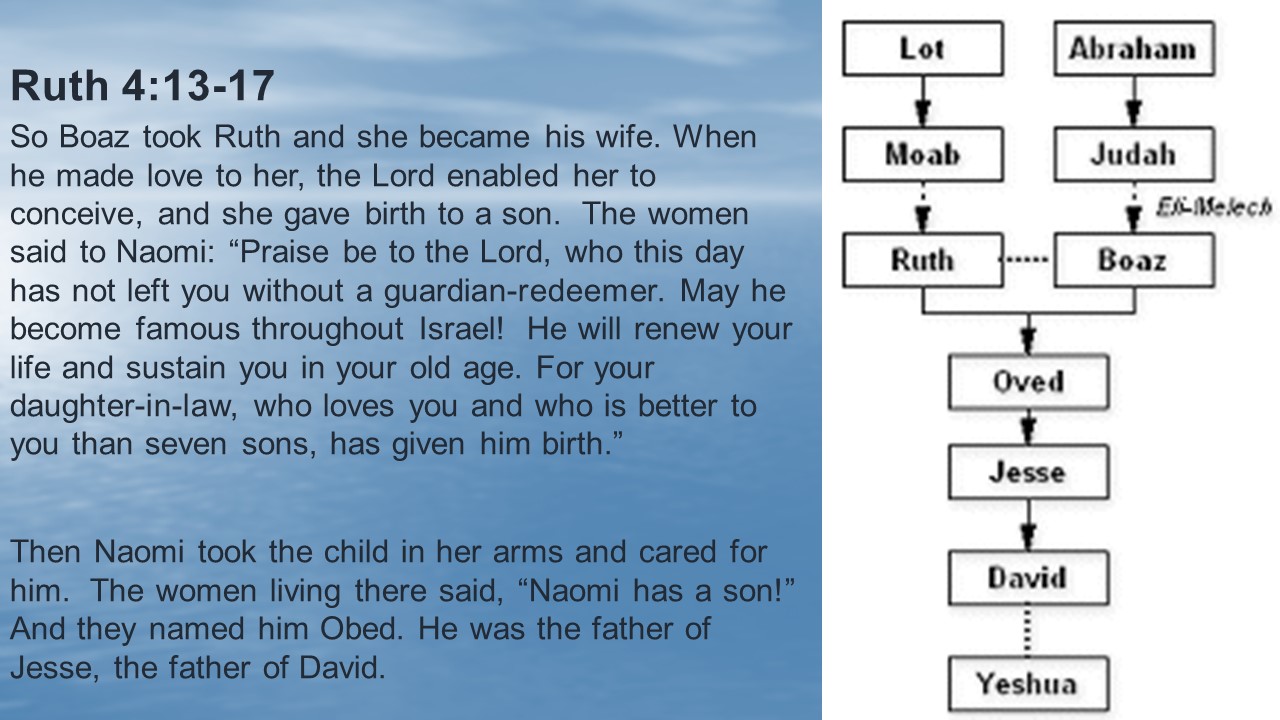
So King David, a man after God’s own heart, was Ruth’s grandson, and David of course is in the lineage of Jesus Christ, our Lord and Savior. When Boaz redeemed Ruth, He did more than accept her as His own. Boaz married her and accepted her as his bride.
In Revelation 21:2 at the beginning of the eternal kingdom, Jesus accepts us, the church, as His bride. In John’s vision:
I saw the Holy City, the new Jerusalem, coming down out of heaven from God, prepared as a bride beautifully dressed for her husband.

Our sins are washed away, we are righteous and beautiful before the Lord. And in our love story, somebody does indeed die at the end. Jesus gave up His life so that you and I could live. And now, I know, my redeemer lives.
And we all lived happily ever after.
To God be the glory. Amen.

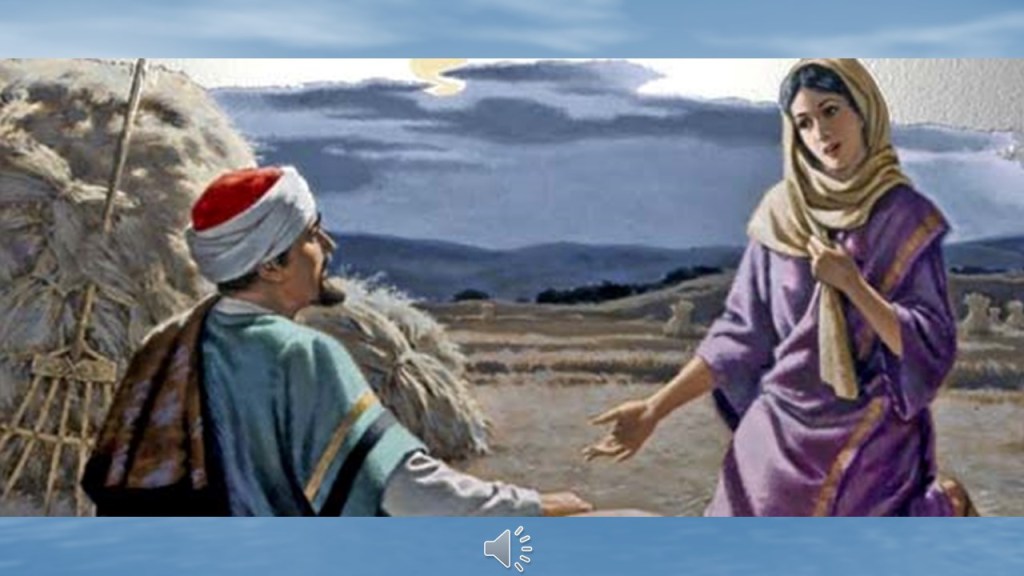
Leave a comment